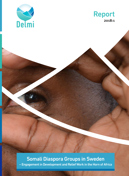To strengthen the positive effects of migration and counteract the negative ones, knowledge of the causes and consequences of migration is required. It is therefore important to understand why migrants leave their home countries and what characterizes these migrants, for example if they are low or highly educated, if they are women or men, which countries they choose to travel to and if they send money home or not. It is also important to study the effect of migration on the former homeland.
The purpose of this study is to contribute with increased knowledge about the driving forces of migration and the effects of remittances in Ethiopia. Ethiopia is an interesting case to study in terms of the driving forces of migration, as the migrants represent different social classes and the migrants are spread over large parts of the world. Ethiopia is also one of the African continent's main recipients of remittances, as well as a country with which Sweden has long-standing relations, not least in the form of development and development cooperation.
Some overall conclusions and recommendations
- The background of migrants, the reasons for migration and the financing of migration differ depending on whether they move to OECD countries, the Middle East or to other African countries.
- Income, network and geographical proximity play a role in the decision to migrate, but play a different role to different destinations. Network factors such as having friends and family in the destination country are especially important when migrating to OECD countries, while ease of entry into the country is a crucial factor for many Ethiopians who migrate within the African continent. The wage factor does not seem to be a central driving force behind migration to OECD countries.
- About half of migrant households receive remittances. The results indicate that migrants have fewer opportunities to remit in the beginning of their time abroad, but that this then increases when the migrant has been abroad for a longer period of time.
- The study shows that remittances have a positive effect on households' subjective assessment of their standard of living. This applies both to how households rank their current situation and how households' situation according to the same yardstick has changed in the last five years.
- The focus should be on enabling more migrants to send money home, and on creating incentives and opportunities for investment in more productive activities.
About the author of the report
The report, International migration and remittances in Ethiopia (2015: 1) is written by Lisa Andersson, Ph.D. in economics and works at the OECD in Paris.
Picture by Gift Habeshaw from Unsplash.




